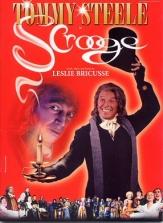Scrooge The Musical 2005
'Scrooge' is a musical adaptation of 'A Christmas Carol', the short story by Charles Dickens, first published in 1843. Having been brought-up on Dickens' work, for me, Christmas is somehow not quite Christmas without seeing one of the film adaptations of the story on Christmas day itself. My particular favourite is the 1951 version starring Alastair Sim.
The title role of 'Scrooge' is played by British veteran entertainer, Tommy Steele, born Thomas Hicks in Bermondsey, South London in 1936. Britain's first 'teen idol', he made his name back in the 1950s as a pop singer, but later made the transition to 'family entertainer'. He's headlined more productions at the London Paladium than any other entertainer in shows such as 'Dick Whittington', 'Hans Anderson', and 'Singin' In The Rain', to name a few. He's probably best known for his role in the rags to riches story, 'Half A Sixpence' during the 1960s, which spawned a film version and also achieved success on Broadway.
Although Tommy Steele is just one year short of being a septuagenarian, there doesn't seem to be much less energy or exuberance in his performance. And therein lies the problem with his characterisation of Ebenezer Scrooge. First, he simply looks too young and virile, in spite of his advancing years, to portray a man wizened and wracked with the overwhelming obsession with money to the exclusion of everything else, including romance or any other worthwhile relationship. And since Steel foregoes any make-up (apart from sporting a lanky hair style), it's hard to separate the entertainer from the character he's trying to play on stage. This is reinforced continually during the show because he seems intent on reminding us that it's Tommy Steele on stage, not Scrooge. He can't seem to resist falling back on his 'cheeky chappy' persona, or employing a jokey mannerism, or dubious morsel of business to raise a quick laugh from the audience.
At the beginning of the play, there is a flicker of an attempt by Steele to plunge himself into the Scrooge character when he's talking with his nephew in his office (if one can call it that). But even this sequence was marred by stumbling between an affected 'posh' accent, and the 'cockney sparrow' one that most people identify him with. And his attempts to describe Scrooge as a doddering old man, resulted in a simian-like gait that would have been more appropriate in a remake of 'Planet of The Apes'.
The book, score and lyrics for this production are by Leslie Bricusse, who is also a veteran of the musical genre having written impressive shows such as 'Stop the World - I Want To Get Off', 'Pickwick', and 'Goodbye, Mr Chips'. However, 'Scrooge' is not one of Bricusse's best works. The script follows the Dickens' story relatively faithfully, but is rather lack-lustre and ordinary. And the songs, though they infect the audience with some degree of emotion and keep the action moving spiritedly along, are not contagious to the degree that they lodge themselves firmly in one's long-term memory. But there's strong singing in this production with good musical direction, and the ensemble pieces are reasonably rousing. In terms of individual performances, Tom Solomon has a particularly formidable voice that projects eagerly to the back of the huge Palladium auditorium without any need for amplification. In contrast, Steele's voice is no longer strong enough to match this kind of youthful vocal gusto, and sometimes not even capable of doing battle effectively with the orchestra.
Paul Farnsworth's set is functional, and even though it's on an impressive scale, isn't stunning. And the costumes were a little too well-cut and 'nice' to reflect the poverty and deprivation of the times. But Paul Kiev's illusions that bring to life the spirits of Jacob Marley and Christmas Past, Present and Christmas Yet To Come, are intriguing. For example, the trick that brings Marley's ghost to the stage from behind a door is particularly effective and surprising.
When redemption eventually comes to Scrooge at the end of the show, Steele dons a Father Christmas outfit and distributes gifts to demonstrate his new-found generosity. I think this dramatic choice was a mistake because it unnecessarily sentimentalises Scrooge's transformation, introducing a kind of consumerist soppiness to an ending that doesn't need or require it.
'Scrooge' makes no real attempt to faithfully re-create the kind of world Dickens was writing about in his tale of poverty, social justice and moral redemption. In that sense, it most certainly disappoints. But what 'Scrooge' is really about is 'entertainment', and the irony is that, despite our reservations, both my guest and I left the theatre feeling that we had indeed been entertained to some extent. And judging by the audience's reaction come the curtain calls, they seemed to feel the same way, so much so that Tommy Steele resorted to the well-worn phrase "Have you got no homes to go to?" to dismiss us from the house.
(Peter Brown)
What the popular press had to say.....
NICHOLAS DE JONGH for THE EVENING STANDARD says, "Melancholia, music-hall atmosphere and pantomimic air... infests this...musical...plodding production." MICHAEL COVENEY for THE INDEPENDENT says, "Enjoyably creaky old musical." MICHAEL BILLINGTON for THE GUARDIAN says, "The best feature of a dull evening is Paul Kieve's illusions." BENEDICT NIGHTINGALE for THE TIMES says, "There are good moments...The singing is often so strong that it seems sad that the tunes and lyrics are so ordinary." CHARLES SPENCER for THE DAILY TELEGRAPH says, "This Scrooge proves quite nauseatingly sentimental."
External links to full reviews from popular press
The Independent
The Guardian
Daily Telegraph
The Times
Originally published on
